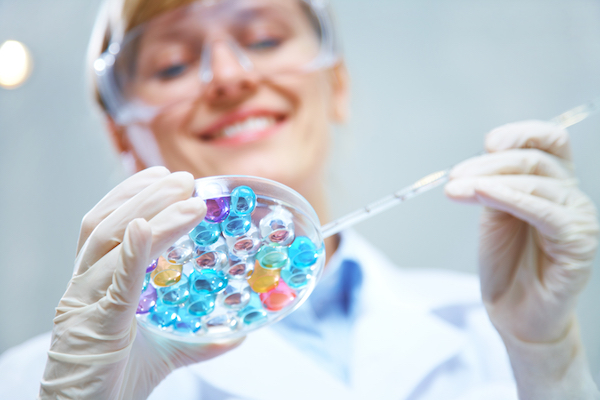
NUTRIGENOMICS
The testing of DNA to determine how different foods may interact with specific genes is not new but as consumers increasingly realise that our physiology is as unique as our personalities, nutrigenomics is going main-stream. The refinement of this technology is offering a major opportunity for us to take charge of our own health and wellbeing.
The cost of in-depth analysis of your bodily make-up, including gut microbe analysis and personalised reports on what you should and shouldn’t be eating for optimal health, has become affordable with packages starting from £99. Companies can also offer insights into body type, strength and aerobic capability.
The ease of testing is fueling this growing trend as kits are received in the post, samples collected at home and sent off to the lab. The analysis takes around 10 days.
GENE THERAPY
Gene therapy shows remarkable potential in treating genetic diseases such as cystic fibrosis, infectious diseases, cancer and even heart disease. It allows for DNA to be introduced into a patient’s cells to compensate for faulty genes or to make an advantageous protein. If a mutated gene causes a required protein to be defective or missing, gene therapy may be able to
introduce a normal copy of the gene to restore the function of the protein.
The development of the CRISPR-Cas9 system over the past decade was an exciting development in the genome editing field and the intrdouction of the CRISPR based ‘prime editing’ holds incredible potential. In a nutshell, it could allow more efficiency, accuracy, speed and importantly, can be used at less cost.
Gene therapy still faces many challenges and is currently primarily available in research settings but with the availability of technologies such as CRISPR, research and development are speeding along.
Big pharma are investing heavily in cell therapy for cancer over the next year and beyond. Several companies are in late-stage development of their genome therapies and the hope is that we will see FDA clearance for the treatment of haemophilia and muscular dystrophy in 2020.
THE WELLNESS SABBATICAL
The need to strike a balance between the pursuit of wellness and the need to work is the central concept of the wellness sabbatical.
According to behavioural psychologists, it takes 21 days to break bad habits and to make lasting lifestyle changes but few of us are fortunate enough to be able to take three weeks away from work to immerse ourselves in nature, yoga, meditation or whatever it is that we yearn for.
Fortunately, the retreat and wellness world is slowly but surely catching up as breaks are being tailored to those of us who want our work and wellness too! Whether in the mountains of Thailand or on the beaches of the Caribbean the wellness sabbatical must offer superfast wifi, be smartphone and laptop friendly and offer flexible time for working as well as pursuing health and happiness. No more shaming for not disconnecting!
At the same time physical pursuits, stress-reducing treatments and opportunities for rest and relaxation should abound.
Surely being allowed to work and play in supportive and beautiful surroundings can only increase health happiness as well as productivity.
FERTILITY ASSISTANCE TECHNOLOGY
As both women and men desire more control over their reproductive health, reproductive assistance, once deemed a luxury, is becoming a growing part of healthcare.
Conversations around fertility are now common as women, long underrepresented in medical research, demand more information, more innovation and the fertility services are listening. Medical research is, of course, expensive but femtech (had to have been coined in Silicone Valley!) start-ups are believed to have secured over £1 billion in investment to date.
Fertility Assistance Technologies include wearables such as the Ava fertility bracelet which tracks physiological signs
and indicates optimal fertile days, with an accuracy of 89%. The hand-held myLotus measures luteinising hormone concentration in a urine sample to indicate the best days for conception. Both these devices allow for information to be followed on an app and period tracking apps are now one of the most popular health categories in the App Store.
New Hope Fertility released an at-home IVF kit, which allows women to privately prepare for the egg retrieval process, while Modern Fertility sells finger-prick tests to gauge reproductive hormones.
Digital platforms such as Peanut Trying to Conceive are increasing in numbers too as women seek and offer support during their journeys to conception and the sperm/egg donor matching app, Just A Baby, is going from strength to strength.
Thankfully, women are not the only ones encouraged to take charge as last year saw an influx of products that measure, track and store male sperm too. This is encouraging as one-third of all infertility cases are reportedly caused by male reproductive issues.
PSYCHEDELIC THERAPY CENTRES
Lastly, but possibly the most fun, is the rise in Psychedelic Therapy Centres where natural psychoactives, such as ayahuasca and magic mushrooms, are used to facilitate therapeutic breakthrough. With converts making statements such as ‘10 years of therapy achieved in 3 days’ this trend is growing.
Not just for hippies and those who long for days gone past, mainstream medicine is taking the emergence of this new psychedelic medical movement seriously. Trials are taking place in Europe and the US with Imperial College London and Johns Hopkins University having launched their own centres into psychedelic research. Results are proving astounding, with patients reporting miraculous and enduring psychological transformations.
The use of psychoactives such as psilocybin, the active in magic mushrooms, is still illegal in most countries, therefore the only therapy available in the UK would be in a clinical research setting but fear not, Holland offers very comfortable, spa-like centres and in Jamaica, you can find yourself breathing tropical air and warming in the sun while experienced facilitators safely guide your journey.
This therapy is set to continue its rise in popularity during 2020. A note to my editor - the use of psychedelic centres must be investigated and I would be willing to do so in Jamaica.





